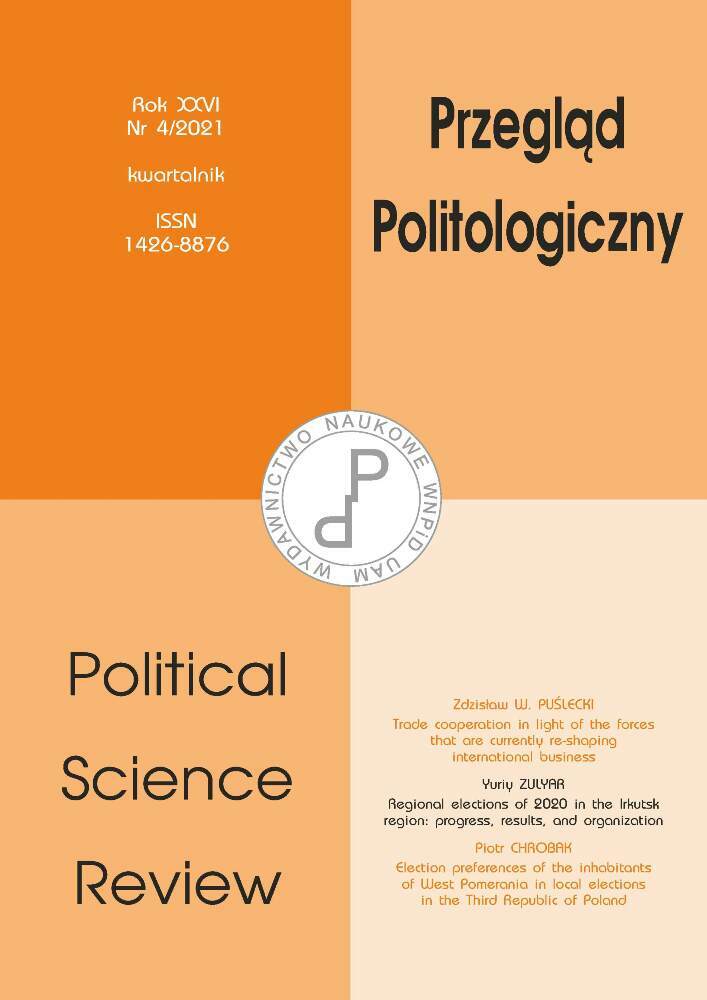Abstract
This text is a continuation of the analysis of the attitudes of politically engaged users of the Facebook, conducted between 13.12.2020 and 25.01.2021 on a sample of 220 respondents. The first statistical conclusions and the full description of the methodology were published in the issue 1/2021 of Przegląd Politologiczny (Pawlak, 2021). In this text, I focused on the interpretation of the open part of the questionnaire, in which the respondents expressed their own ideas and forecasts regarding the possibility of ending/mitigating the conflict. While the data from closed questions could be treated as coming from a group representative of politically engaged Facebook users in Poland (although this condition was more of an added value than the intention behind the research), the material containing answers to open-ended questions is no longer of this nature. This is due to the fact that 43.6% of the respondents left this section unanswered. The analysis presented here prompts reflection on the conciliatory potential of social media, which I consider to be an important platform for political debate in the 21st century.
References
Almond G., Verba S. (1989), The Civic Culture. Political Attitudes and Democracy in Five Nations, London.
Bell D. (1973), The Coming of Post-Industrial Society. A Venture In Social Forecasting, New York.
Beniger J. (1989), The Control Revolution: Technological and Economic Origins of the Information Society, Harward.
Bierzanek R., Symonides J. (2005), Prawo międzynarodowe publiczne, Warszawa.
Castells M. (2013), Władza komunikacji, tłum. J. Jedliński, P. Tomanek, Warszawa.
Dijk van J. (2010), Społeczne aspekty nowych mediów. Analiza społeczeństwa sieci, tłum. J. Konieczny, Warszawa.
Drucker P. (1942), The Future of Industrial Man, New York.
Górniak J., Wachnicki J. (2013), Pierwsze kroki w analizie danych IBM SPSS Statistics, Kraków.
Hallin D., Mancini P. (2007), Systemy medialne. Trzy modele mediów i polityki w ujęciu porównawczym, Kraków.
Janc K., Jurkowski W. (2021), Media społecznościowe w czasie pandemii. Przykład profili wrocławskich rad osiedla na Facebooku, „Rozwój Regionalny i Polityka Regionalna”, 51/2021, Poznań, s. 9–24.
Kupiecki R., Chłoń T., Bryjka F. et al. (2020), Platforma przeciwdziałania dezinformacji. Budowanie odporności społecznej badania i edukacja, Warszawa.
Machlup F. (1972), The Production and Distribution of Knowledge in the United States, New Yersey.
McLuhan M. (1964), Understanding Media. The Extensions of Man, New York.
Milbrath L. W., Goel L. (1977), Political Participation: How and why Do People Get Involved in Politics, New York.
Mouffe Ch. (2005), Paradoks demokracji, tłum. J. Wach, M. Kamińska, A. Orzechowski, Wrocław.
Pawlak P. (2018), Cyfrowa kultura masowa a kultura polityczna społeczeństwa informacyjnego, Poznań.
Pawlak P. (2021), Political dispute in Poland in the eyes of Facebook slacktivists, “Przegląd Politologiczny”, nr 1, Poznań, pp. 23–37.
Toffler A., Toffler H. (1996), Budowa nowej cywilizacji. Polityka trzeciej fali, tłum. J. Łoziński, Poznań.
Touraine A. (1977), The voice and the eye: an analysis of social movements, Cambridge.
Wiatr J. (1999), Socjologia polityki, Warszawa.
Christensen H. (2011), Political activities on the Internet: Slacktivism or political participation by other means?, https://firstmonday.org/article/view/3336/2767, Feb 2021.
FakeHunter, https://fakehunter.pap.pl, Oct 2021.
Paialunga P. (2021), https://towardsdatascience.com/fake-news-detection-with-machine-learning-using-python-3347d9899ad1, Feb 2021.
Państwowa Komisja Wyborcza, 2021, https://pkw.gov.pl/, Oct 2021.

